Watched (and Read) May 14 - 20, 2007
Only one actual movie to report:
Heisei tanuki gassen pompoko / Pom Poko (Isao Takahata, 1994)
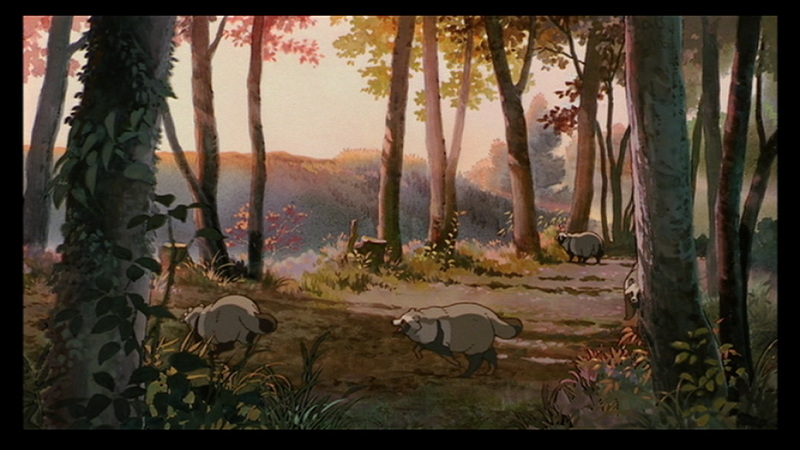 Despite the fact that the subtitles call the creatures who star in this cartoon epic of forest animals fighting encroaching development "raccoons", they are really "raccoon dogs" ("tanuki" in Japanese): http://en.wikipedia.org/wiki/Raccoon_Dog
Despite the fact that the subtitles call the creatures who star in this cartoon epic of forest animals fighting encroaching development "raccoons", they are really "raccoon dogs" ("tanuki" in Japanese): http://en.wikipedia.org/wiki/Raccoon_Dog
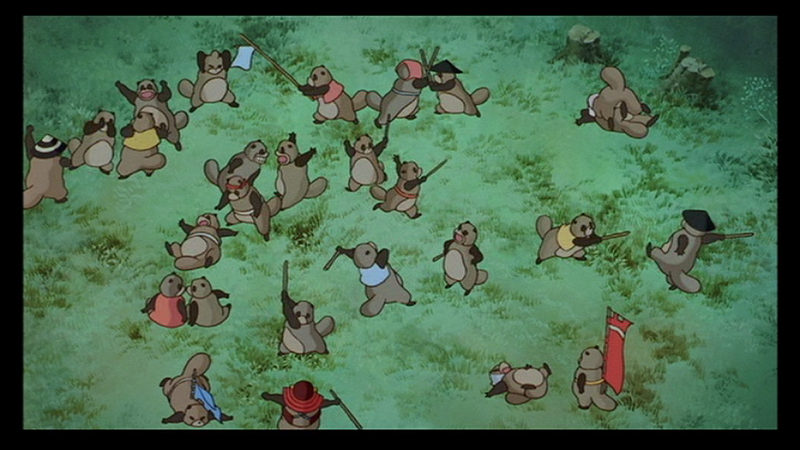 This is probably the hardest of all Ghibli films for Western audiences to come to terms with. It is unabashedly culturally specific -- and probably a comprehensive annotated booklet would be quite helpful for Western viewers. that said, the basic outline of the story is simple enough. T
This is probably the hardest of all Ghibli films for Western audiences to come to terms with. It is unabashedly culturally specific -- and probably a comprehensive annotated booklet would be quite helpful for Western viewers. that said, the basic outline of the story is simple enough. T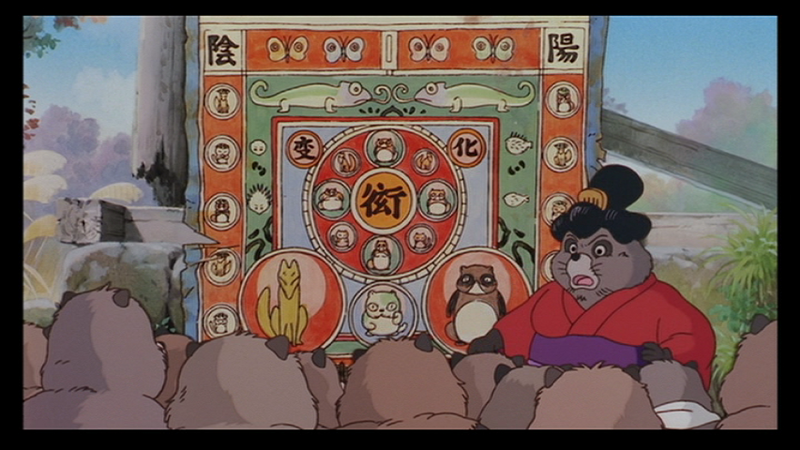 anuki living in the Tama Hills on the outskirts of Tokyo in the mid-1960s find their habitat being bulldozed and leveled. Being the most magical of Japanese animals (along with foxes), they fight back -- using all their skills (which include shape changing). T
anuki living in the Tama Hills on the outskirts of Tokyo in the mid-1960s find their habitat being bulldozed and leveled. Being the most magical of Japanese animals (along with foxes), they fight back -- using all their skills (which include shape changing). T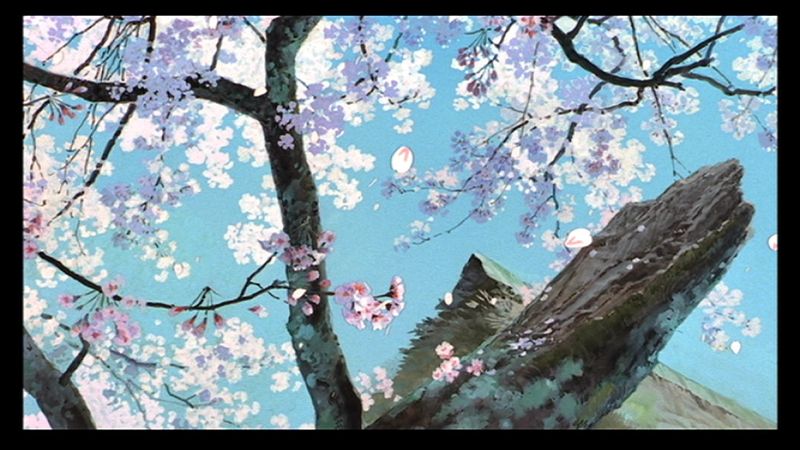 he effectiveness of their defense is undermined, from time totime, by their indolent and easygoing natures, but ever more devastating onslaughts by developers renew their determination. They send for aid to the most skilled tanuki clans of rural Japan, but it takes a long time for it to arrive.
he effectiveness of their defense is undermined, from time totime, by their indolent and easygoing natures, but ever more devastating onslaughts by developers renew their determination. They send for aid to the most skilled tanuki clans of rural Japan, but it takes a long time for it to arrive. 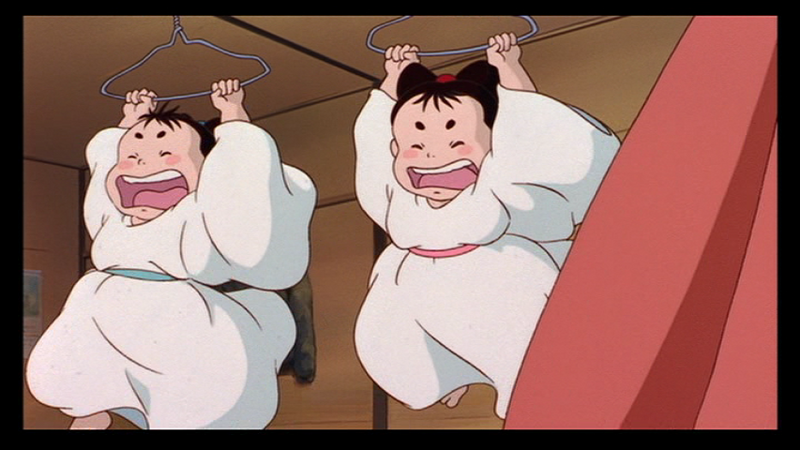 Meanwhile foxes provide some questionable advice (let all shape changers simply pretend to be humans -- and let the less skilled fend for themselves). Despite many extraordinary magical accomplishments, the tanuki do not manage to stem the human tide. But tanuki are resourceful and persistent ...
Meanwhile foxes provide some questionable advice (let all shape changers simply pretend to be humans -- and let the less skilled fend for themselves). Despite many extraordinary magical accomplishments, the tanuki do not manage to stem the human tide. But tanuki are resourceful and persistent ...
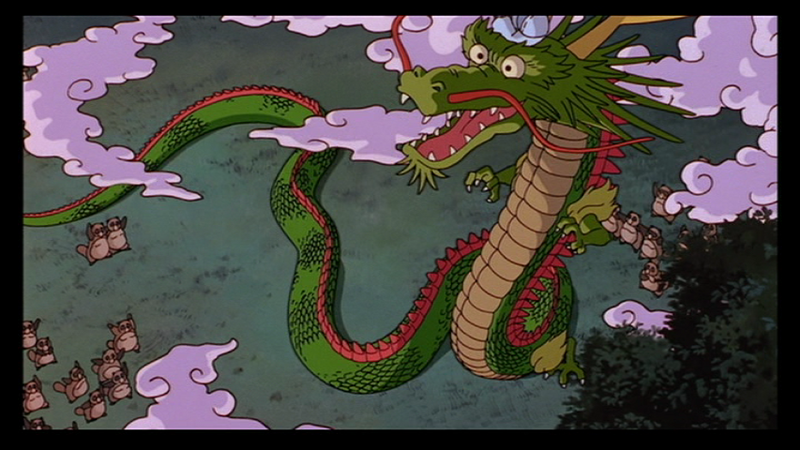 Very talky at times -- and a bit overly ideological for some (probably), but many many moments of great beauty (capturing the natural world of the tanuki) and imagination (such as the magical feats the tanuki perform. Although this is a Takahata film, it sketches out a number of themes and visual ideas that would later surface in Miyazaki's Princess Mononoke and Spirited Away.
Very talky at times -- and a bit overly ideological for some (probably), but many many moments of great beauty (capturing the natural world of the tanuki) and imagination (such as the magical feats the tanuki perform. Although this is a Takahata film, it sketches out a number of themes and visual ideas that would later surface in Miyazaki's Princess Mononoke and Spirited Away. 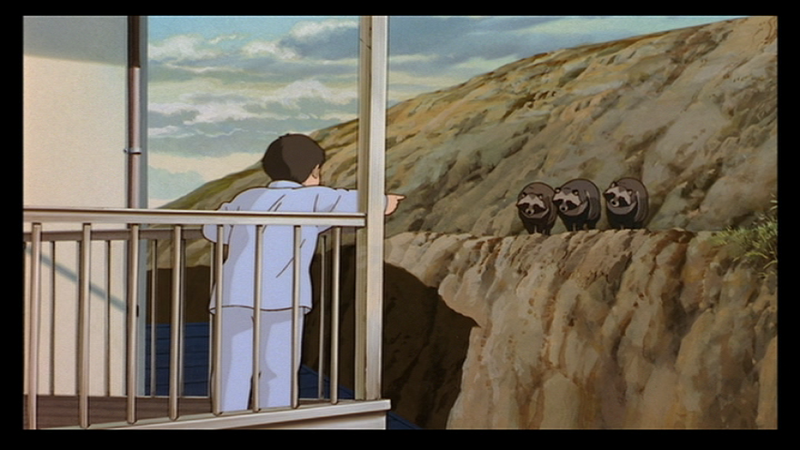 An extra on the Japanese DVD (and preceding video release) that does not appear to be included on the Disney DVD -- a 15 minute long recitation by a story teller recounting folk tales about tanuki and foxes which I very much wish was subbed).
An extra on the Japanese DVD (and preceding video release) that does not appear to be included on the Disney DVD -- a 15 minute long recitation by a story teller recounting folk tales about tanuki and foxes which I very much wish was subbed).
More pictures:
http://i9.photobucket.com/albums/a59/mkerpan/pom_poko/pp01.png
http://i9.photobucket.com/albums/a59/mkerpan/pom_poko/pp04.png
http://i9.photobucket.com/albums/a59/mkerpan/pom_poko/pp07.png
http://i9.photobucket.com/albums/a59/mkerpan/pom_poko/pp08.png
http://i9.photobucket.com/albums/a59/mkerpan/pom_poko/pp09.png
http://i9.photobucket.com/albums/a59/mkerpan/pom_poko/pp11.png
http://i9.photobucket.com/albums/a59/mkerpan/pom_poko/pp12.png
http://i9.photobucket.com/albums/a59/mkerpan/pom_poko/pp13.png
http://i9.photobucket.com/albums/a59/mkerpan/pom_poko/pp15.png
http://i9.photobucket.com/albums/a59/mkerpan/pom_poko/pp16.png
http://i9.photobucket.com/albums/a59/mkerpan/pom_poko/pp18.png
Other things to report:
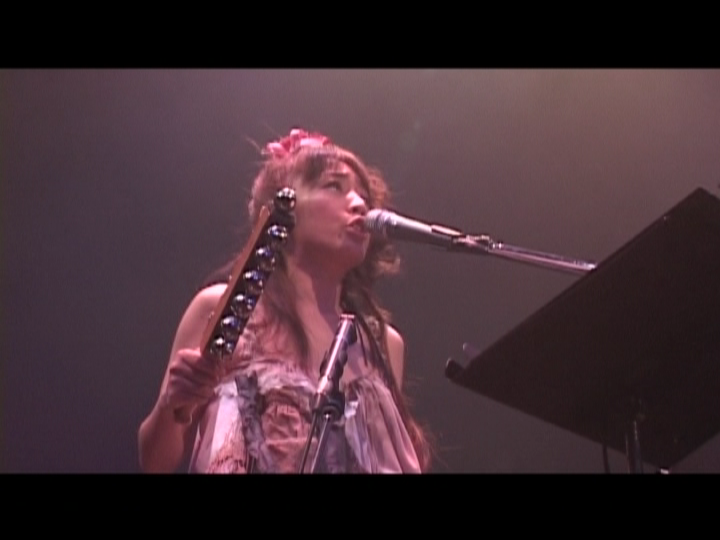 I watched a DVD of a Yoko Ueno's 20th Anniversary Concert, featuring a live performance with one of the groups she works with * (or asterisk). Probably best known in the West for her music for animated shows like Azumanga Daioh, Ueno is a musician of great talent -- and varied interests (ranging from Celtic music to folk rock to experimental acappella to jazz and more). Highlights included one of the themes songs to
I watched a DVD of a Yoko Ueno's 20th Anniversary Concert, featuring a live performance with one of the groups she works with * (or asterisk). Probably best known in the West for her music for animated shows like Azumanga Daioh, Ueno is a musician of great talent -- and varied interests (ranging from Celtic music to folk rock to experimental acappella to jazz and more). Highlights included one of the themes songs to  Azumanga Daioh ("Raspberry Heaven"), an original ballad that one would swear was a centuries old Irish air ("Seven Swan Songs" -- in Japanese, despite the title) and a remarkable sequence that called to mind Frank Zappa and the Mothers of Invention. asterisk is a remarkable assemblage of veteran musicians -- who seem to play just about anything with spirit and authenticity. (they have a lead guitarist who looks rather like Takeshi Kitano -- and sounds like he has studied the Allman Brothers quite intensively).
Azumanga Daioh ("Raspberry Heaven"), an original ballad that one would swear was a centuries old Irish air ("Seven Swan Songs" -- in Japanese, despite the title) and a remarkable sequence that called to mind Frank Zappa and the Mothers of Invention. asterisk is a remarkable assemblage of veteran musicians -- who seem to play just about anything with spirit and authenticity. (they have a lead guitarist who looks rather like Takeshi Kitano -- and sounds like he has studied the Allman Brothers quite intensively).
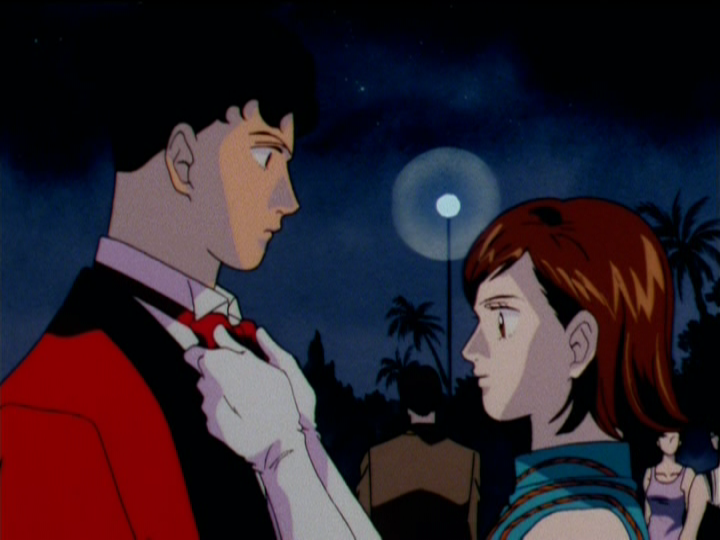 We continue to work our way through the 51 episode animated shoujo masterpiece Hana yori dango (Boys Over Flowers --- a very very loose reworking of Jane Austen's Pride and Prejudice, among other things) for the benefit of a friend of our children. (Nonetheless, my wife is as big a fan of this series as I am). Nine volumes down, 3 to go.
We continue to work our way through the 51 episode animated shoujo masterpiece Hana yori dango (Boys Over Flowers --- a very very loose reworking of Jane Austen's Pride and Prejudice, among other things) for the benefit of a friend of our children. (Nonetheless, my wife is as big a fan of this series as I am). Nine volumes down, 3 to go.
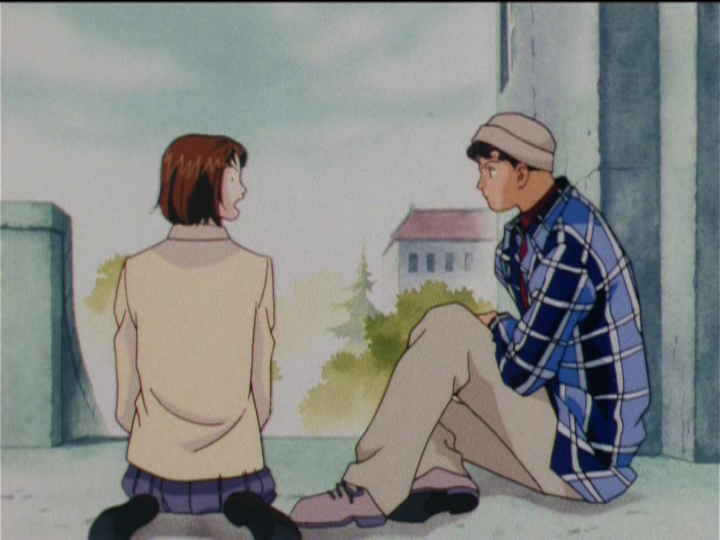 And then there is the manga version. Volume 23 of the English translation just came out (13 more to go -- meaning over two years before this reaches its conclusion). This installment was written long after the animated series ended -- so we are in uncharted territory. And we finally acquired volumes 1 through 8 of the manga on sale (the series tracked these volumes quite closely -- but there's plenty of additional details scattered throughout).
And then there is the manga version. Volume 23 of the English translation just came out (13 more to go -- meaning over two years before this reaches its conclusion). This installment was written long after the animated series ended -- so we are in uncharted territory. And we finally acquired volumes 1 through 8 of the manga on sale (the series tracked these volumes quite closely -- but there's plenty of additional details scattered throughout).
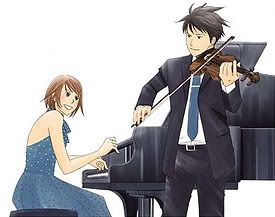 While (15 years after its beginning), Boys Over Flowers probably remains Japan's number one cultural export to Asia (translated versions of the manga and anime -- and a Taiwanese live action TV adaptation, "Meteor Garden" that was a smash hit throughout Asia in its own right), the quirky manga Nodame Cantabile (initiated in 2001) --
While (15 years after its beginning), Boys Over Flowers probably remains Japan's number one cultural export to Asia (translated versions of the manga and anime -- and a Taiwanese live action TV adaptation, "Meteor Garden" that was a smash hit throughout Asia in its own right), the quirky manga Nodame Cantabile (initiated in 2001) -- 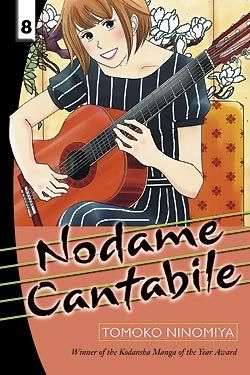 the story of a rather eccentric young woman pianist, a grown-up musical prodigy who wants to be a conductor and their friends and associates at a music conservatory -- is beginning to gain lots of new attention. In the past year or so, the manga has gotten a high-profile live-action adaptation and an animated one. Although this manga has reached the mid-teens in Japan, the English version is only up to volume 9 -- and I've only recently managed to track down volume 8. (I may have been among the first few people in the West to encounter the series -- I ordered the unsubbed volume 1 back in 2002).
the story of a rather eccentric young woman pianist, a grown-up musical prodigy who wants to be a conductor and their friends and associates at a music conservatory -- is beginning to gain lots of new attention. In the past year or so, the manga has gotten a high-profile live-action adaptation and an animated one. Although this manga has reached the mid-teens in Japan, the English version is only up to volume 9 -- and I've only recently managed to track down volume 8. (I may have been among the first few people in the West to encounter the series -- I ordered the unsubbed volume 1 back in 2002).
Yoko Kamio, the author of Boys Over Flowers didn't waste any time jumping into a new manga series when she ended her first major series in 2003. Perhaps not surprisingly, her next venture Cat Street seems to be going in a very different direction from its highly energetic predecessor. Cat Street recounts the story of a former child star, betrayed by the one person she considered her true friend, who retreated into a hole of her own making for years -- and (at the outset) is just beginning to timidly venture out into the world again. E
Perhaps not surprisingly, her next venture Cat Street seems to be going in a very different direction from its highly energetic predecessor. Cat Street recounts the story of a former child star, betrayed by the one person she considered her true friend, who retreated into a hole of her own making for years -- and (at the outset) is just beginning to timidly venture out into the world again. E arly on, she is convinced to try out a "free school" for other drop-outs -- so she can start making up for her lost education (and lost time). Despite its introspective nature, this series is doing increasingly well in Japan -- with the newest volume (no. 6) climbing to the top of the new manga charts. Even so, no English version is in sight yet. So, I get to struggle through this with dictionaries by my side. In the newest version, our heroine Keito (Kate) actually goes to her first movie audition -- and is horrified to discover that the script she has to cope with uses lots of kanji (that she never learned -- due to her still very deficient education). Young actress Aoi Miyazaki (Eureka, Gaichu, Nana) seems just about perfect for the central role of a movie adaptation of this (not that one has been announced -- yet).
arly on, she is convinced to try out a "free school" for other drop-outs -- so she can start making up for her lost education (and lost time). Despite its introspective nature, this series is doing increasingly well in Japan -- with the newest volume (no. 6) climbing to the top of the new manga charts. Even so, no English version is in sight yet. So, I get to struggle through this with dictionaries by my side. In the newest version, our heroine Keito (Kate) actually goes to her first movie audition -- and is horrified to discover that the script she has to cope with uses lots of kanji (that she never learned -- due to her still very deficient education). Young actress Aoi Miyazaki (Eureka, Gaichu, Nana) seems just about perfect for the central role of a movie adaptation of this (not that one has been announced -- yet).
Heisei tanuki gassen pompoko / Pom Poko (Isao Takahata, 1994)
 Despite the fact that the subtitles call the creatures who star in this cartoon epic of forest animals fighting encroaching development "raccoons", they are really "raccoon dogs" ("tanuki" in Japanese): http://en.wikipedia.org/wiki/Raccoon_Dog
Despite the fact that the subtitles call the creatures who star in this cartoon epic of forest animals fighting encroaching development "raccoons", they are really "raccoon dogs" ("tanuki" in Japanese): http://en.wikipedia.org/wiki/Raccoon_Dog This is probably the hardest of all Ghibli films for Western audiences to come to terms with. It is unabashedly culturally specific -- and probably a comprehensive annotated booklet would be quite helpful for Western viewers. that said, the basic outline of the story is simple enough. T
This is probably the hardest of all Ghibli films for Western audiences to come to terms with. It is unabashedly culturally specific -- and probably a comprehensive annotated booklet would be quite helpful for Western viewers. that said, the basic outline of the story is simple enough. T anuki living in the Tama Hills on the outskirts of Tokyo in the mid-1960s find their habitat being bulldozed and leveled. Being the most magical of Japanese animals (along with foxes), they fight back -- using all their skills (which include shape changing). T
anuki living in the Tama Hills on the outskirts of Tokyo in the mid-1960s find their habitat being bulldozed and leveled. Being the most magical of Japanese animals (along with foxes), they fight back -- using all their skills (which include shape changing). T he effectiveness of their defense is undermined, from time totime, by their indolent and easygoing natures, but ever more devastating onslaughts by developers renew their determination. They send for aid to the most skilled tanuki clans of rural Japan, but it takes a long time for it to arrive.
he effectiveness of their defense is undermined, from time totime, by their indolent and easygoing natures, but ever more devastating onslaughts by developers renew their determination. They send for aid to the most skilled tanuki clans of rural Japan, but it takes a long time for it to arrive.  Meanwhile foxes provide some questionable advice (let all shape changers simply pretend to be humans -- and let the less skilled fend for themselves). Despite many extraordinary magical accomplishments, the tanuki do not manage to stem the human tide. But tanuki are resourceful and persistent ...
Meanwhile foxes provide some questionable advice (let all shape changers simply pretend to be humans -- and let the less skilled fend for themselves). Despite many extraordinary magical accomplishments, the tanuki do not manage to stem the human tide. But tanuki are resourceful and persistent ... Very talky at times -- and a bit overly ideological for some (probably), but many many moments of great beauty (capturing the natural world of the tanuki) and imagination (such as the magical feats the tanuki perform. Although this is a Takahata film, it sketches out a number of themes and visual ideas that would later surface in Miyazaki's Princess Mononoke and Spirited Away.
Very talky at times -- and a bit overly ideological for some (probably), but many many moments of great beauty (capturing the natural world of the tanuki) and imagination (such as the magical feats the tanuki perform. Although this is a Takahata film, it sketches out a number of themes and visual ideas that would later surface in Miyazaki's Princess Mononoke and Spirited Away.  An extra on the Japanese DVD (and preceding video release) that does not appear to be included on the Disney DVD -- a 15 minute long recitation by a story teller recounting folk tales about tanuki and foxes which I very much wish was subbed).
An extra on the Japanese DVD (and preceding video release) that does not appear to be included on the Disney DVD -- a 15 minute long recitation by a story teller recounting folk tales about tanuki and foxes which I very much wish was subbed).More pictures:
http://i9.photobucket.com/albums/a59/mkerpan/pom_poko/pp01.png
http://i9.photobucket.com/albums/a59/mkerpan/pom_poko/pp04.png
http://i9.photobucket.com/albums/a59/mkerpan/pom_poko/pp07.png
http://i9.photobucket.com/albums/a59/mkerpan/pom_poko/pp08.png
http://i9.photobucket.com/albums/a59/mkerpan/pom_poko/pp09.png
http://i9.photobucket.com/albums/a59/mkerpan/pom_poko/pp11.png
http://i9.photobucket.com/albums/a59/mkerpan/pom_poko/pp12.png
http://i9.photobucket.com/albums/a59/mkerpan/pom_poko/pp13.png
http://i9.photobucket.com/albums/a59/mkerpan/pom_poko/pp15.png
http://i9.photobucket.com/albums/a59/mkerpan/pom_poko/pp16.png
http://i9.photobucket.com/albums/a59/mkerpan/pom_poko/pp18.png
Other things to report:
 I watched a DVD of a Yoko Ueno's 20th Anniversary Concert, featuring a live performance with one of the groups she works with * (or asterisk). Probably best known in the West for her music for animated shows like Azumanga Daioh, Ueno is a musician of great talent -- and varied interests (ranging from Celtic music to folk rock to experimental acappella to jazz and more). Highlights included one of the themes songs to
I watched a DVD of a Yoko Ueno's 20th Anniversary Concert, featuring a live performance with one of the groups she works with * (or asterisk). Probably best known in the West for her music for animated shows like Azumanga Daioh, Ueno is a musician of great talent -- and varied interests (ranging from Celtic music to folk rock to experimental acappella to jazz and more). Highlights included one of the themes songs to  Azumanga Daioh ("Raspberry Heaven"), an original ballad that one would swear was a centuries old Irish air ("Seven Swan Songs" -- in Japanese, despite the title) and a remarkable sequence that called to mind Frank Zappa and the Mothers of Invention. asterisk is a remarkable assemblage of veteran musicians -- who seem to play just about anything with spirit and authenticity. (they have a lead guitarist who looks rather like Takeshi Kitano -- and sounds like he has studied the Allman Brothers quite intensively).
Azumanga Daioh ("Raspberry Heaven"), an original ballad that one would swear was a centuries old Irish air ("Seven Swan Songs" -- in Japanese, despite the title) and a remarkable sequence that called to mind Frank Zappa and the Mothers of Invention. asterisk is a remarkable assemblage of veteran musicians -- who seem to play just about anything with spirit and authenticity. (they have a lead guitarist who looks rather like Takeshi Kitano -- and sounds like he has studied the Allman Brothers quite intensively). We continue to work our way through the 51 episode animated shoujo masterpiece Hana yori dango (Boys Over Flowers --- a very very loose reworking of Jane Austen's Pride and Prejudice, among other things) for the benefit of a friend of our children. (Nonetheless, my wife is as big a fan of this series as I am). Nine volumes down, 3 to go.
We continue to work our way through the 51 episode animated shoujo masterpiece Hana yori dango (Boys Over Flowers --- a very very loose reworking of Jane Austen's Pride and Prejudice, among other things) for the benefit of a friend of our children. (Nonetheless, my wife is as big a fan of this series as I am). Nine volumes down, 3 to go. And then there is the manga version. Volume 23 of the English translation just came out (13 more to go -- meaning over two years before this reaches its conclusion). This installment was written long after the animated series ended -- so we are in uncharted territory. And we finally acquired volumes 1 through 8 of the manga on sale (the series tracked these volumes quite closely -- but there's plenty of additional details scattered throughout).
And then there is the manga version. Volume 23 of the English translation just came out (13 more to go -- meaning over two years before this reaches its conclusion). This installment was written long after the animated series ended -- so we are in uncharted territory. And we finally acquired volumes 1 through 8 of the manga on sale (the series tracked these volumes quite closely -- but there's plenty of additional details scattered throughout). While (15 years after its beginning), Boys Over Flowers probably remains Japan's number one cultural export to Asia (translated versions of the manga and anime -- and a Taiwanese live action TV adaptation, "Meteor Garden" that was a smash hit throughout Asia in its own right), the quirky manga Nodame Cantabile (initiated in 2001) --
While (15 years after its beginning), Boys Over Flowers probably remains Japan's number one cultural export to Asia (translated versions of the manga and anime -- and a Taiwanese live action TV adaptation, "Meteor Garden" that was a smash hit throughout Asia in its own right), the quirky manga Nodame Cantabile (initiated in 2001) --  the story of a rather eccentric young woman pianist, a grown-up musical prodigy who wants to be a conductor and their friends and associates at a music conservatory -- is beginning to gain lots of new attention. In the past year or so, the manga has gotten a high-profile live-action adaptation and an animated one. Although this manga has reached the mid-teens in Japan, the English version is only up to volume 9 -- and I've only recently managed to track down volume 8. (I may have been among the first few people in the West to encounter the series -- I ordered the unsubbed volume 1 back in 2002).
the story of a rather eccentric young woman pianist, a grown-up musical prodigy who wants to be a conductor and their friends and associates at a music conservatory -- is beginning to gain lots of new attention. In the past year or so, the manga has gotten a high-profile live-action adaptation and an animated one. Although this manga has reached the mid-teens in Japan, the English version is only up to volume 9 -- and I've only recently managed to track down volume 8. (I may have been among the first few people in the West to encounter the series -- I ordered the unsubbed volume 1 back in 2002).Yoko Kamio, the author of Boys Over Flowers didn't waste any time jumping into a new manga series when she ended her first major series in 2003.
 Perhaps not surprisingly, her next venture Cat Street seems to be going in a very different direction from its highly energetic predecessor. Cat Street recounts the story of a former child star, betrayed by the one person she considered her true friend, who retreated into a hole of her own making for years -- and (at the outset) is just beginning to timidly venture out into the world again. E
Perhaps not surprisingly, her next venture Cat Street seems to be going in a very different direction from its highly energetic predecessor. Cat Street recounts the story of a former child star, betrayed by the one person she considered her true friend, who retreated into a hole of her own making for years -- and (at the outset) is just beginning to timidly venture out into the world again. E arly on, she is convinced to try out a "free school" for other drop-outs -- so she can start making up for her lost education (and lost time). Despite its introspective nature, this series is doing increasingly well in Japan -- with the newest volume (no. 6) climbing to the top of the new manga charts. Even so, no English version is in sight yet. So, I get to struggle through this with dictionaries by my side. In the newest version, our heroine Keito (Kate) actually goes to her first movie audition -- and is horrified to discover that the script she has to cope with uses lots of kanji (that she never learned -- due to her still very deficient education). Young actress Aoi Miyazaki (Eureka, Gaichu, Nana) seems just about perfect for the central role of a movie adaptation of this (not that one has been announced -- yet).
arly on, she is convinced to try out a "free school" for other drop-outs -- so she can start making up for her lost education (and lost time). Despite its introspective nature, this series is doing increasingly well in Japan -- with the newest volume (no. 6) climbing to the top of the new manga charts. Even so, no English version is in sight yet. So, I get to struggle through this with dictionaries by my side. In the newest version, our heroine Keito (Kate) actually goes to her first movie audition -- and is horrified to discover that the script she has to cope with uses lots of kanji (that she never learned -- due to her still very deficient education). Young actress Aoi Miyazaki (Eureka, Gaichu, Nana) seems just about perfect for the central role of a movie adaptation of this (not that one has been announced -- yet).
Comments